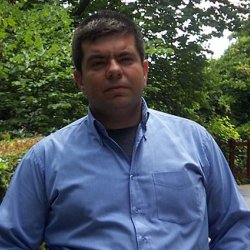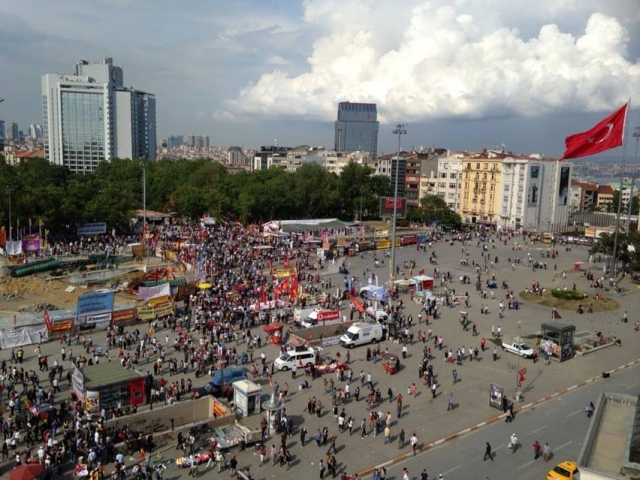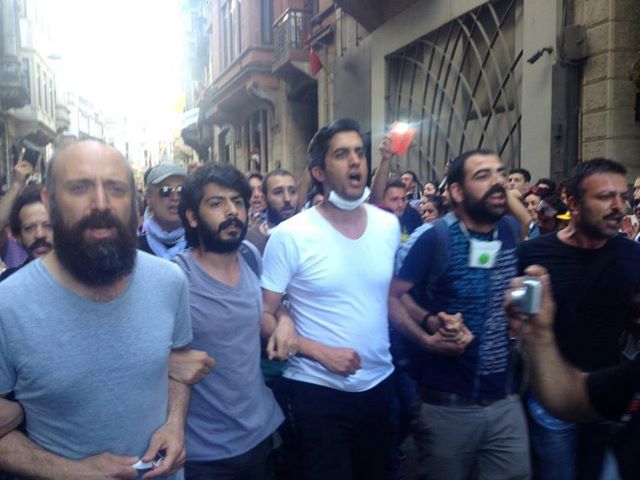Title photo: REUTERS/Stoyan Nenov
Anastasia Balezdrova
Six days after they started, the protests in Istanbul and other Turkish cities are not losing their dynamics. Thousands of Turks continue to protest in the streets and a commission of the "occupiers" in Taksim Square, where it had all begun, met today with Deputy Prime Minister Bulent Arinc and President Abdullah Gul.
 Evangelos Kehriotis, who has a PhD of Historical Sciences and is Assistant Professor in the Department of History at Bogazici University, is talking with GRReporter about the future of the protests and their impact on the politics and governance of the country.
Evangelos Kehriotis, who has a PhD of Historical Sciences and is Assistant Professor in the Department of History at Bogazici University, is talking with GRReporter about the future of the protests and their impact on the politics and governance of the country.
Mr. Kehriotis, what is the situation in Istanbul today? Are the protests continuing? Are the police still so aggressive? Has the information on killed and injured protesters been confirmed? On the other hand, how is daily life in the city now?
As far as I know, two people have been killed. The police have completely succumbed already. Last night, I spent a few hours at the place of the protests. The area around Taksim Square and the whole of Istiklar Avenue in the neighbourhood of Beyoğlu were full of people. There are no policemen there. The police forces are deployed further down, near the seafront. According to what I read in the morning, there were no clashes last night.
The region is totally free and the fact that the absence of the police is strengthening the relations between the people is very impressive. There is no tension between them. Various small structures such as a small clinic and a restaurant have been organized in the park. Now, a library is being created. The atmosphere is very festive; a symphony orchestra performed a small concert yesterday. People with a different ideology and political orientation, who, until yesterday, were in conflict, are now together. There are some disputes for sure but there is no tension at all.

Photo: REUTERS/Yannis Behrakis
Life in the city continues as usual. There are protests and processions in various districts but I have no information on conflicts there.
What are the reasons for this rebellion? In recent years, Turkey has achieved huge economic growth and logically, the people are living better than a few years ago. In this case, what is it that has made them go out into the streets to protest?
The shortest answer to this question is that economic development is not always a guarantee for a better life.
The more analytical response is as follows: In recent years, Turkey has achieved incredible economic development, improved its infrastructure and enhanced its international position. The indicators here are very different from those in southern Europe. The unemployment rate is not high but on the other hand, the conditions of employment are not the best for the majority of people. Wages are low, the standard of living is high and so, many people are struggling with the costs, although they are working.
The second point is that this government has been in power for many years now and this fact itself causes tension because there is no opposition force that is able to threaten the government.
Thirdly, a number of laws and bans have been adopted that directly affect the freedom of expression. It is known that many journalists have been in jail for years and the situation with many students is similar. There are various bans related to lifestyle. A ban on alcohol consumption has been recently adopted. Before that, there were rules for the behaviour of women which certainly restricted them in many ways. There is also a part of society that believes that the old principles of Kemalism are being violated whereas others disagree with the attempts to solve the Kurdish issue, which should have been the main topic in the Turkish public space. All these people, each of them in compliance with their own principles, are very angry. This resentment was the reason for the outbreak of this rebellion. In addition, I would say that they are angry at the government less and more at Prime Minister Recep Tayyip Erdogan.
In this connection, the logical question arises of why the Prime Minister has decided to intervene in the individual lives of people in this way. Isn’t this self-destroying for him?
The success of this government is based on the fact that it has been able to isolate and marginalize the once all-powerful military regime and the old way a smart Turkish bourgeoisie perceived the world. It has been able to free the minds of the majority of the population – its conservative and religious elements – that follow certain rules in their daily lives, assuming, however, that no one should interfere in the lives of others. So, this is how it was in the early days of the ruling of the party.
Now, the government is exactly on the opposite shore. Moreover, it shows its desire to satisfy that part of society that was considered repressed, such as women who were not allowed to attend universities or to go to work with headscarves. The cabinet is demonstrating its will to expand and impose this conservative way of life that, until recently, was semi-legal among other members of society too. This, actually, poses huge problems, because, in this way, the government is turning against the principles that it itself had proclaimed. This is the end of the legitimacy of the political language of the cabinet, which it used all these years.
Yesterday, Recep Tayyip Erdogan called the protesters "terrorists." Is there any evidence that Kurdish organizations are standing behind them?
No, it is just the opposite. Currently, the Turkish government is in contact with the Kurdistan Workers’ Party (PKK) in order to reach a dialogue to lead to pacification in turn.
The major concern is that so far, a very large part of the participants in this movement do not want an agreement on this issue to be reached. They are either nationalists or old Kemalists who are against the government in general and who fear that such an agreement will be equal to national treason.
Others argue the opposite: that those who go out into the streets are putting at risk the process of pacification. At the beginning of the events, the Kurds were quite reserved and some leaders made quite unsuccessful statements. As far as I know, they already support the movement and they had even organized a large meeting in Diyarbakir a large meeting in support of the movement in Istanbul.
However, this is not the point. Many leaders in various countries, including Greece, perceive similar dynamic responses as a disagreement within a democratic regime. According to them, it should be expressed through elections and in parliament. Activism is not considered as a legitimate activity of citizens. This is a very important element because, actually, activism is not based on majorities. This thesis exists in many countries but it is stronger in Turkey.

How do you assess the call of PKK leader Abdullah Ocalan on suspending the armed actions? How do you think the Kurdish issue will develop?
It was the result of negotiations that lasted for a long period of time. Ocalan is still the leader of the great majority among the Kurds. I think this was a very smart move by Erdogan or by the people around him. Otherwise, the problem would not have been resolved.
However, my personal opinion is that this was a political move too. Erdogan intends to run for president of the Republic of Turkey and believes that if he attracts the Kurds and receives the ovations for solving the Kurdish issue, this will help him a lot to be able to assume the presidency. That is why he is scared of the events because they may jeopardize the whole process of pacification.
What I have just said is an assessment that is supported by all analysts in Turkey. The only thing that bothers me in the whole story is that it is controlled "from above". That is to say, that the commissions of "wise men" had already been formed and they toured throughout Turkey to talk with the people and listen to their concerns. This is important, of course, because those people come from the media, arts, from the intelligentsia in general. On the other hand, they are like ‘tools’ who have been sent to fulfil a specific mission, which seems odd and out of place in the eyes of many people here. Somehow, people with a different ideology have suddenly found the need for solving the Kurdish issue peacefully and there is something false in this situation.
Until the outbreak of the protests, this process was developing well. We will see how it will continue, but personally, I hope that it will be completed successfully. I fully support these actions but I just cannot but mention the presence of a political manoeuvre.
How do you think the developments related to the protests will evolve and how will they end up?
The protesters have four demands. The first is the cancellation of the plans to build a shopping centre. The second is the release of the captured protesters. The third is for the government to apologize and the fourth is related to today's World Environment Day. Last year, the competent parliamentary commission approved a law that should have been discussed in parliament today. It provides for the protection of the environment and natural diversity. According to many commentators, this law actually allows massive construction in different areas and their use for commercial purposes in general.
If these demands are satisfied and the core of the blockade in the park does not insist on its completely pointless demand for the resignation of the government, especially the Kemalists and some leftist persons such as the Communists, whose call is for the government to resign, this is just pointless and inappropriate.
If the other demands are met and the majority is convinced that the protest has been successful, it could end in a few days. Nevertheless, it will not end tomorrow or the next day, it could even continue for another 10 days because the movement is still dynamic and the people are not tired. The people are very excited, they are doing different things and will not leave them unfinished.
How would you comment on the opinion that a more conservative Islam is being imposed in Turkey?
This is not a Turkish phenomenon - it exists around the world. This process has been ongoing over the past few years and it has been expressed in different ways in different countries.
It is connected with the revival of some basic values such as family and religion. In a sense, it is like experiencing the 1980s again but as a farce.
In practice, what we feared for years happened in Turkey. There were at least two ways to complete the democratization of society. The first was that this would happen with the participation of the people and without the dependence of the process on economic indicators. The second was democratization through strong economic development based on economic indicators that ignore a large part of society. The second scenario happened. Turkey is about to become an Asian "miracle", where the focus is on the development, and the construction of large shopping centres and the record rise in the financial market are considered as progress, but social harmony is not taken into account. The Turkish society has lost its harmony and the latest developments are the result of this process. Societies lose their harmony not only in terms of poverty, but also in terms of prosperity.
Is there a political alternative to the ruling party in Turkey?
I do not think the Kurds could work together with the Republican People's Party, which has not been paying any attention to them for decades.
Currently, the ruling party has no alternative that can form a cabinet. For better or worse, the answer for the alternative is inside the same party and this is not strange . Inside the party, there are people such as President Abdullah Gul, whom even voters of other parties like better than the Prime Minister. By this, I mean that the power of the party may have lost its legitimacy in the face of Erdogan but there are other people inside it who can take it forward in a new direction.
Furthermore, a huge part of the population voted for the Justice and Development Party (AKP) and now, these people are silent. When it comes to elections, they will go to the polls and vote again for the AKP. They are not interested in the events because they live well and the only thing they care about is to become a conservative middle class. They have already fulfilled this dream, they feel good and do not care about the things that we are discussing. I am not saying that they are the majority but certainly, they are a very big part of Turkish society.
Are the allegations that the Turkish Prime Minister is trying to revive the Ottoman Empire grounded and to what extent? Do you see such points in his policy?
I think that this is happening more at a verbal level than in practice. It is a kind of ostentation and aesthetics and there are his attempts to make the Turks feel proud, but this is not much different from similar actions taken by the leaders of other countries.
Proof of this is the great fiasco with Syria. Even if he had some aspirations for something like this, they were suspended after the failure as regards Syria, the dust of which has not yet subsided despite the efforts of the cabinet.
If Erdogan wanted to become a sultan, he should have invaded Syria a year ago, he should have conquered it to prove that this was his plan. I do not think that he was planning something like that and he could not do so. All this remains at an aesthetical level and rests on glorifying a glorious past. Moreover, this is good for him because this undermines the rhetoric of the Republican People's Party on Ataturk and democracy.